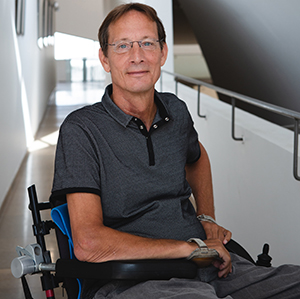Vance Bergeron, Ane Aanesland, Livio de Luca, and Orphée Cugat are the 2019 CNRS Innovation Medallists. Since 2011, this CNRS prize has rewarded researchers for their work in the technological, therapeutic, economic, and social fields.
Vance Bergeron, breaking away from paralysis

Nothing can stop Vance Bergeron's determination. After becoming tetraplegic following an accident, the CNRS physicist at Laboratoire de physique de l'ENS de Lyon (CNRS/ENS de Lyon/Université Claude Bernard Lyon 1) developed solutions to improve the quality of life of paralysed individuals through daily physical activity. The holder of a PhD thesis in chemical engineering from the University of California at Berkeley (US), he met his future wife during a post-doctoral fellowship in France, and decided to settle there. After a few years working at Rhône-Poulenc, he joined the CNRS in 2000. Vance Bergeron then began work on biological decontamination systems for air using cold plasmas. He took part in the creation of the company Airinspace, which equips oncology, haematology, and burn treatment wards, and for which he serves as scientific advisor. He is the author of over one hundred scientific publications and forty patents. In 2013, a car refused him right of way and struck him while he was riding a bike to his laboratory, leaving him tetraplegic and without the use of his hands. He redirected his research to the functional electrical stimulation that remobilises paralysed members through weak electrical pulses. His research is supported by ENS de Lyon, CNRS, Hospices civils de Lyon and the association Advanced Neurorehabilitation Therapies and Sport (ANTS), which he cofounded. Assisted by his former doctoral student Amine Metani, Bergeron created the project Circles, which develops electrostimulation bicycles and rowing machines intended for functional rehabilitation centres and gyms dedicated to persons with motor disabilities. ANTS inaugurated the first gym of this kind in France, where their prototypes will be tested in 2020.






